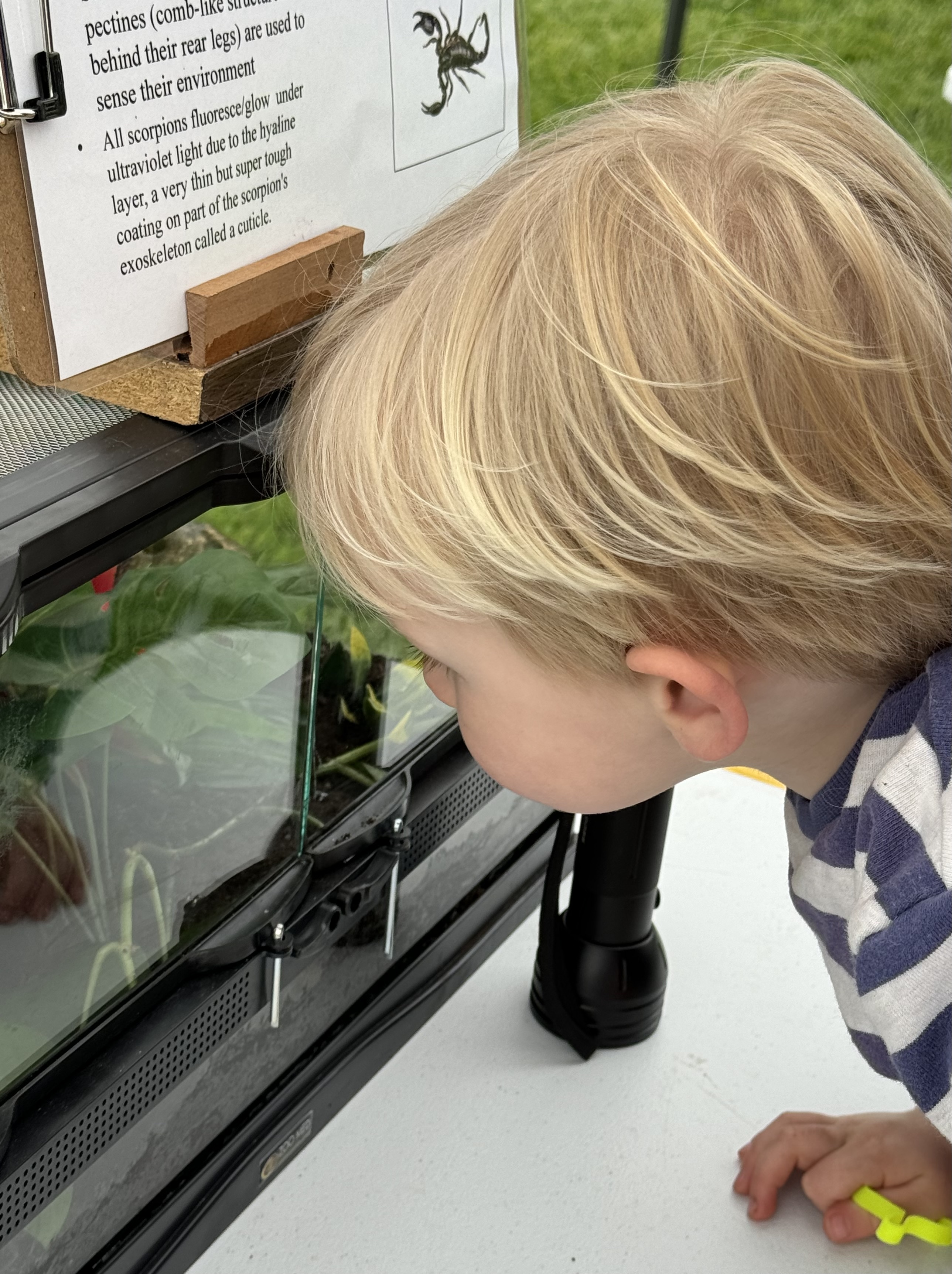We often hear of the benefits of using solar power to heat, cool, light homes, and recharge batteries for back-up power. Did you know that solar power also can be used for cooking? Have you considered that your next automobile might be an electric one, but fear you know very little about the new technology? Those attending Mount Vernon District’s 6th Annual Environment Expo on April 27 had an opportunity to learn about solar cooking, electric cars, and many other informative subjects related to reducing our reliance on fossil fuels, protecting the environment and environmental services.
 Samuel Reilly (2), of Alexandria, gets in close to look for Scorpions from Reptile Wonders
Samuel Reilly (2), of Alexandria, gets in close to look for Scorpions from Reptile Wonders
Those with interest in environmental issues, and sufficient hardiness to brave the light rain, made their way to Fort Hunt Park on Saturday morning. The Mount Vernon event, although smaller than the County’s Earth Day Fairfax 2024 in Sully which drew approximately 7,000 visitors, stood out for the number of nature advocacy groups and county departments present with tables and information to share. On offer were such things as: native plants from Plant NOVA Natives; native wildflower seeds and composting bins from the Department of Public Works and Environmental Services; home energy checklists and ideas on how to save home energy costs from the Department of Environment and Energy Coordination; and mosquito dunks, from the Health Department.
The environmental event was hosted by Supervisor Dan Storck, in partnership with the National Park Service. These events raise awareness about environmental issues and hopefully stoke our collective consciousness to better support Mother Nature.
Afzal and Zainab Syed exhibited a variety of solar cookers. The invitation to their table suggests being inspired to try this energy saving method. As they sought to demonstrate, a solar oven can be used just like a crock pot or a normal oven. Solar cooker temperatures can easily reach between 200°F and 300°F, which means they safely cook dishes, even those containing meat — though cooking times will often be longer. There are three main types of solar cookers on the market today – box, panel, and parabolic reflector cookers, which the Syeds had on display. On a rainy day, it is the absence of the sun, rather than the rain that impacts other outdoor cooking methods, that affects solar cooking.
A contingent of electric cars were on display, part of a new kind of car club, Electric Vehicle Association of Greater Washington, DC. Owners were showing off their vehicles and answering questions to promote electric vehicles as an environmental and energy alternative. The local group, part of a national association, is dedicated to helping others learn more about electric cars now on the market. To view their helpful vehicle information sheet summary list, see https://evadc.org/wp-content/uploads/2021/09/EVInfoSheet-20210907.pdf
Expo information for both children and adults, included learning the importance and methods of reducing green house gas emissions, mitigating climate change to protect ecosystems, and using trees to control flooding and water quality. As a reminder that creatures also depend on healthy, functioning ecosystems, several species of wildlife were on-site for close-up viewing.
Cooler temperatures kept the reptile contingent of “Reptile Wonders’ Nature Center on the Go” warm at home, but an interesting collection of insects crawled in as substitutes. Meeting the bugs served as a reminder of the loss of so many species on which birds and plants depend for a healthy ecosystem.
The raptors of “Secret Garden Birds and Bees,” including several owls and hawks, stared back just as wide-eyed as their visitors, who got the opportunity to get within wing distance. The birds, most of which suffered an injury preventing their return to the wild, are now experienced ambassadors, often attending events to share information about their kind. The importance of birds to our ecosystem as major pollinators, seed dispersers, insect controllers, and scavengers, often may be overlooked, but they are appreciated for their song and beauty.
Visitors waited for face painting and popcorn, fished for trash with the Girl Scouts, listened to the Anthony James Band, touched big service trucks and police cars, and roamed over the park’s green grass to see and learn.
